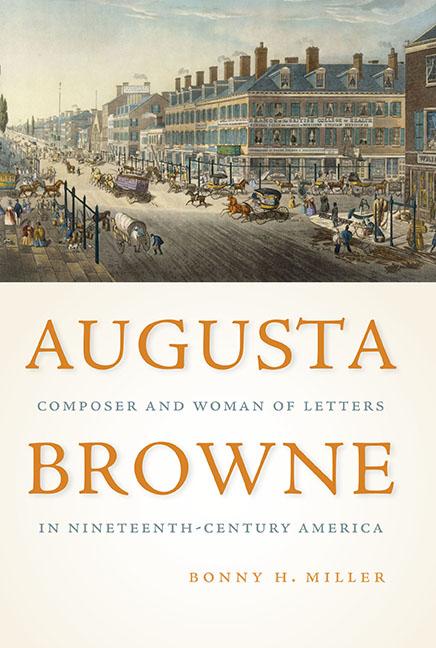Book contents
- Frontmatter
- Contents
- List of Illustrations
- Preface
- Acknowledgments
- Introduction
- 1 First Steps
- 2 Apprentice in a Family Music Business
- 3 Philadelphia Debut
- 4 A Young Professor of Music
- 5 A New Leaf
- 6 Her Own Woman
- 7 Courtship and Consequences
- 8 Pilgrim in Progress
- 9 “Glad Fruition”
- 10 Legacy in Music
- 11 Legacy in Literature
- 12 Contributions to Music Journalism
- 13 A Legacy Written into History
- Appendixes
- Appendixe 1 Children and Descendants of David Samuel Browne and Elizabeth Montgomery Browne
- Appendixe 2 Chronology of Augusta Browne’s Music and Letters
- Appendixe 3 List of Musical Works
- Appendix 4 Selected Glossary
- List of Abbreviations
- Notes
- Selected Bibliography
- Index
11 - Legacy in Literature
Published online by Cambridge University Press: 23 October 2020
- Frontmatter
- Contents
- List of Illustrations
- Preface
- Acknowledgments
- Introduction
- 1 First Steps
- 2 Apprentice in a Family Music Business
- 3 Philadelphia Debut
- 4 A Young Professor of Music
- 5 A New Leaf
- 6 Her Own Woman
- 7 Courtship and Consequences
- 8 Pilgrim in Progress
- 9 “Glad Fruition”
- 10 Legacy in Music
- 11 Legacy in Literature
- 12 Contributions to Music Journalism
- 13 A Legacy Written into History
- Appendixes
- Appendixe 1 Children and Descendants of David Samuel Browne and Elizabeth Montgomery Browne
- Appendixe 2 Chronology of Augusta Browne’s Music and Letters
- Appendixe 3 List of Musical Works
- Appendix 4 Selected Glossary
- List of Abbreviations
- Notes
- Selected Bibliography
- Index
Summary
The composer-turned-author Augusta Browne avoided such tropes of antebellum female domestic life as the happy home, cherubic babies, or the selfless wife and mother. She looked outward, rather than inward or toward intimacy, and never took the common (if profitable) path of telling women how to manage their households and family—the backbone of women's periodicals and of much literature marketed to them. She leapfrogged over advice articles and conduct books to those subjects most important to her: music, literature, the fine arts, and the Christian faith.
In nineteenth-century America, just as in eighteenth-century Britain, print culture marginalized women at the same time that it depended on them as consumers of novels and periodicals. Sentimental fiction, prescriptive advice/conduct books, and devotional works—even those written by women—shaped their readership with a firm didactic purpose, rather than mirroring women's actual lives and experience. Despite a growing presence in print, antebellum women writers were ever more funneled into a “discourse of domesticity” limited to topics (home, family, and virtue) and genres (poems, stories, household manuals) considered appropriate for womanhood to read and to write about. Men remained the gatekeepers at cultural institutions that defined creative merit while assigning women to serve as nurturers of music, literature, and art.
American women nevertheless published novels with considerable success. The literary historian Joyce Warren avers that “women dominated the literary scene in the United States in the mid-nineteenth century” with best-selling novels, yet these women were “systematically excluded” and forgotten in twentieth-century histories of American literature. In Warren's view, these female writers did not focus on the central narrative of a heroic male quest; thus, novels by women diverged from the dominant pattern of American fiction that would enter the literary canon, such as Herman Melville's Moby Dick (1851). Warren also blames the disdain of later decades on the “moral earnestness and sentimentalism” that characterize the work antebellum female writers. Harriet Beecher Stowe retained fame and recognition, however sentimental her prose, because “no book in American history molded public opinion more powerfully than Uncle Tom's Cabin.”
- Type
- Chapter
- Information
- Augusta BrowneComposer and Woman of Letters in Nineteenth-Century America, pp. 263 - 278Publisher: Boydell & BrewerPrint publication year: 2020



